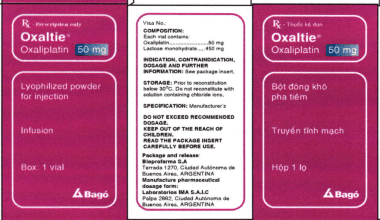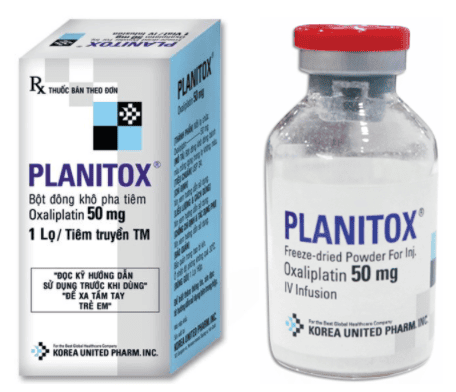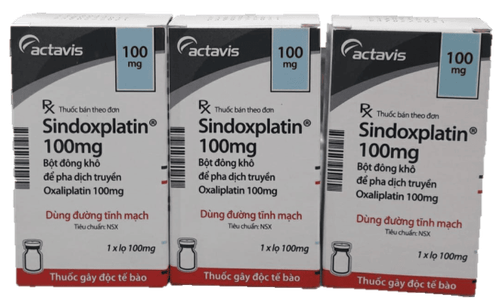This is an automatically translated article.
Gastrointestinal stromal cell carcinoma (GIST) can occur in the esophagus, stomach, or intestines. The use of drugs to treat stomach cancer, digestive cancer is relatively difficult, one of the drugs used to treat these cancers is Avapritinib.
1. What disease does Avapritinib treat?
What is Avapritunib? This medication is used to treat cancer of the stomach, esophagus, or intestines (also known as gastrointestinal stromal cell cancer -GIST). Avapritinib belongs to the group of kinase inhibitors, which work to slow or stop the growth of digestive cancer cells.
SEE ALSO: Keytruda immunotherapy - A new step in the treatment of esophageal cancer
2. How to use Avapritinib to treat digestive cancer
Avapritinib is taken by mouth, 1 to 2 hours after a meal (on an empty stomach) or as directed by your doctor, once a day. In case of vomiting after taking the medicine, the patient should not take the next dose immediately to make up for the vomited dose, but take the next dose at the same time as usual. The dose of Avapritinib depends on the patient's medical condition, type of digestive cancer, response to treatment and other concomitant medications.
While using the stomach cancer drug Avapritinib, patients should not eat grapefruit or drink grapefruit juice without the guidance of a doctor. Grapefruit may increase the risk of side effects from medications. Accordingly, patients need to use Avapritinib regularly and regularly to bring the highest treatment effect. To make it easier to remember, take Avapritinib at the same time each day. An important note is that patients should not arbitrarily change the dose or use the wrong medicine, because the digestive cancer will not improve faster, but the risk of serious side effects will increase.

Thuốc Avapritinib sử dụng qua đường uống theo hướng dẫn của bác sĩ
3. Side effects of the stomach cancer drug Avapritinib
The common side effects of Avapritinib are:
Dizziness; Drowsiness, fatigue; Muscle weakness; Swelling, tearing; Diarrhea, loss of appetite, change in appetite, stomach pain, abdominal pain; Nausea or vomiting, sometimes very serious. Some patients may need a prescription from a doctor to prevent or reduce nausea and vomiting. Also, eating smaller meals, not eating before taking your medication, or limiting activities can help ease this side effect. Changes in hair color and temporary hair loss may occur. Hair will return to normal after the treatment is over.
People using this medicine may experience serious side effects. However, doctors decided to use Avapritinib after assessing that the benefits outweighed the risk of side effects. At the same time, the treating physician will take measures to carefully monitor the patient to reduce the risk of unwanted effects.
Avapritinib can change a patient's thinking or mood (which can be very serious). Tell your doctor immediately if you have any signs of mental/mood changes while taking Avapritinib, such as: forgetfulness, confusion, unclear thinking, difficulty communicating or talking, trouble sleeping. or hallucinations. Changes in behavior may also occur such as agitation, depression, irritability, or personality changes.
Avapritinib digestive cancer medicine can cause bleeding, bleeding in the brain. Recognize the signs of this condition such as severe headache, vision changes, drowsiness or weakness on one side of the body... to take appropriate measures.
Avapritinib may affect fertility in both men and women. Consult your treating physician for more details. In addition, this stomach cancer drug can reduce the patient's resistance, reduce the patient's ability to fight infections, leading to an increased risk of infections or aggravation of infections. are suffering. Avapritinib can cause a rash, but it's usually not serious. However, patients may not be able to tell if this is a side effect or a sign of serious allergic conditions. Therefore, seek medical attention immediately if a rash develops during treatment with Avapritinib.

Thuốc điều trị ung thư dạ dày Avapritinib có thể gây triệu chứng chóng mặt trong quá trình sử dụng
4. Some notes when using Avapritinib for digestive cancer
When using avapritinib, patients should inform their doctor or pharmacist if they have ever been allergic to this active ingredient or its ingredients. In addition, all other allergies should also be considered. Before using Avapritinib, tell your doctor about all medical history, especially interested in diseases such as:
Diseases or abnormalities of the liver, kidneys Brain cancer; Stroke or transient ischemic attack - TIA. Avapritinib may make patients more susceptible to infections or may worsen any existing infections. Therefore, avoid contact with patients with diseases that are easily transmitted from person to person (such as chickenpox, measles, flu). Do not get vaccinated without your doctor's approval. Limit contact with people who have recently received a live attenuated vaccine (such as the nasal flu vaccine). To reduce the risk of skin abrasions, bruising, or other injuries, patients should be careful with sharp objects such as razors and nail clippers and avoid vigorous activities such as sports that require contact.
Inform your doctor if you are pregnant or planning to become pregnant. Your doctor may order a pregnancy test before you start taking Avapritinib. Patients should not become pregnant while taking this gastrointestinal cancer drug because of the risk of harm to the fetus.
Women of childbearing age should learn about reliable birth control methods while using the pill and for at least 6 weeks after stopping it. If you become pregnant, talk to your doctor right away about the risks and benefits of Avapritinib. Because of Avapritinib's potential for absorption through the skin or inhalation and possible harm to an unborn baby, women who are pregnant or may become pregnant should not use this medicine or breathe in the dust from the tablet.
5. Avapritinib drug interactions
Drug interactions between Avapritinib and other drugs may affect the effectiveness of treatment and increase the risk of unwanted effects. Talk to your doctor about all medications the patient is taking (including prescription, over-the-counter, and herbal products). At the same time, when using this gastrointestinal cancer drug, patients should not start, stop or change the dose of any medicine without their doctor's approval.
Avapritinib có thể tương tác với một số loại thuốc khác trên thị trường
Some drugs can affect the removal of avapritinib from the body, which may affect how avapritinib works. Examples include:
azole antifungals (such as fluconazole, itraconazole); Macrolide antibiotics (such as erythromycin); rifamycins antibiotics (such as rifampin, rifabutin); Medicines to treat seizures (such as carbamazepine, phenytoin). Avapritinib is prescribed by doctors to treat gastrointestinal diseases, in order for the drug to work best as well as avoid unwanted side effects, patients need to follow the doctor's instructions.
Please dial HOTLINE for more information or register for an appointment HERE. Download MyVinmec app to make appointments faster and to manage your bookings easily.
Reference source: webmd.com












